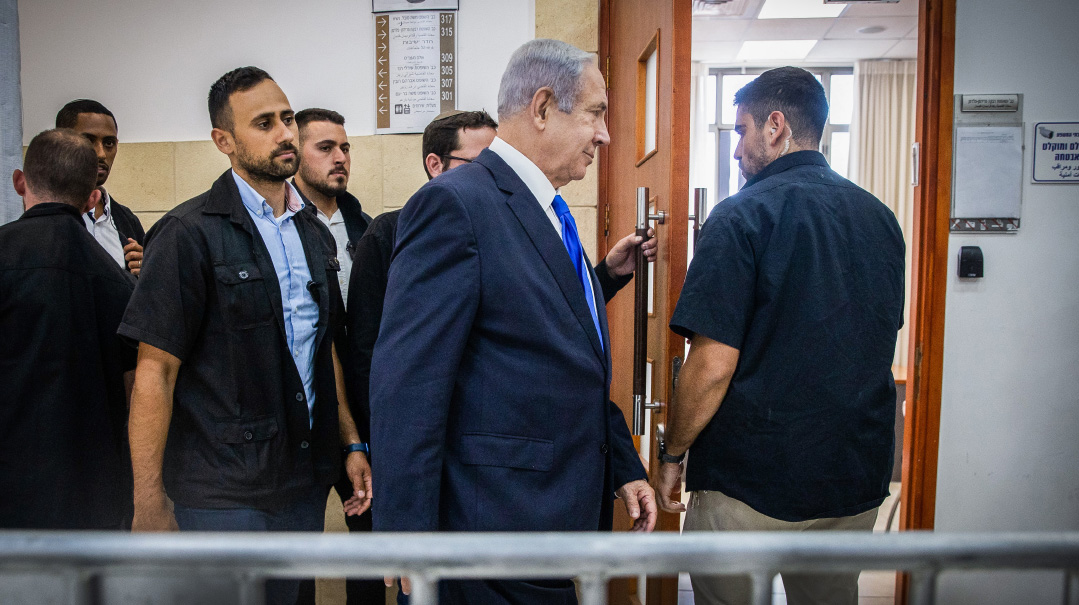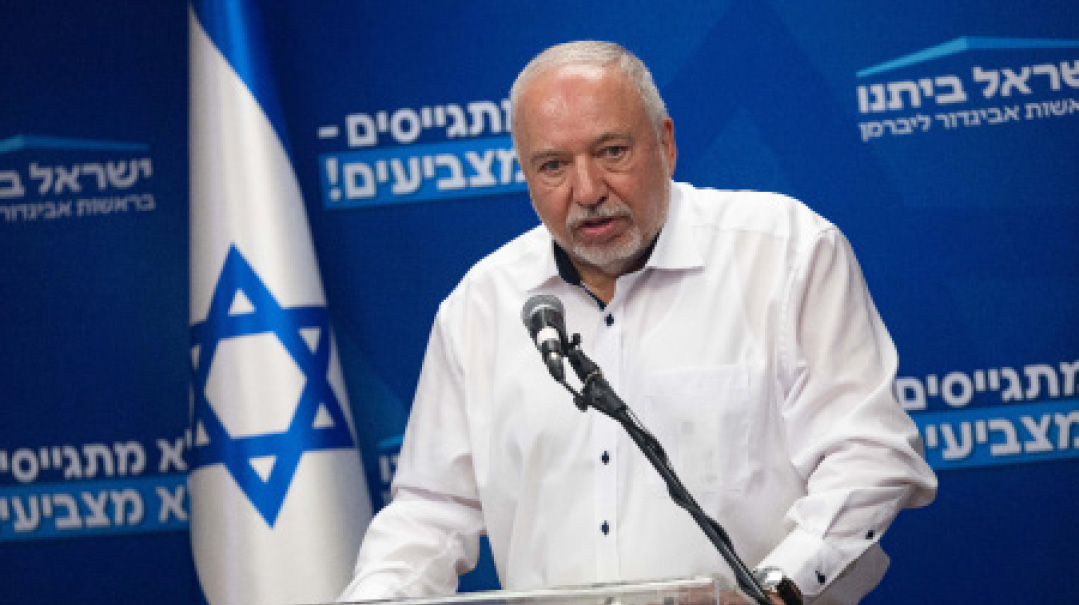Bibi Gets Good News

Trial judges indicate that Bibi didn't bribe

Photos: Flash90
Almost two years ago, in our annual Rosh Hashanah Year in Review, I made a bold prediction: that the judges presiding over Binyamin Netanyahu’s corruption cases would “pull the plug” on his trial sometime in 5782. I was nine months early, and while Bibi is far from going “scot-free” as the headline indicated, the most serious charge against him may soon be shelved. After two years of testimony from more than 50 witnesses, the three-judge Jerusalem District Court panel summoned prosecutors and defense attorneys to their chambers last week saying that the prosecution has failed to prove the bribery allegations against Netanyahu and recommended both sides enter into a plea-bargain on the remaining charges of fraud and breach of trust. This is a developing story at press time, and there will be many twists and turns.
What led the judges to their conclusion? Will Attorney General Gali Baharav-Miara accept their recommendation? Will Netanyahu get off the hook, or pay with his career? Will the overzealous police investigators, prosecutors, and the media who declared Netanyahu guilty before being proven innocent continue with business as usual? And how will the latest development impact the bigger picture of judicial reform?
1
BIBI’S VINDICATION: HOW IT HAPPENED
The bribery charge leveled against Prime Minister Netanyahu was always farfetched. Prosecutors, in a suit known as Case 4000, accused Netanyahu of promoting a merger between the Bezeq phone company and Yes, a leading satellite TV provider. In exchange, Netanyahu was to receive favorable media coverage on Walla, a Bezeq subsidiary and popular news website that was consistently antagonistic to him.
Even if such an arrangement were discussed, there is no legal precedent that clamoring for better coverage is bribery. Trust me, I’ve been in journalism for close to 30 years, and politicians are always angling for positive press, and the only quid pro quo you might get is slightly better access. Walla’s editor-in-chief and a trio of their top political reporters testified they had no direct contact with Netanyahu regarding coverage. Defense attorneys combed through 315 cases in which Walla reportedly wrote something favorable about Bibi and found that the vast majority originated from official government press releases widely distributed to all media outlets.
Prosecutors also alleged Netanyahu committed a breach of trust by ousting the director-general of the Ministry of Communications, who opposed the merger, in favor of his own pro-merger appointee. This is true, but the defense proved there were overriding professional considerations in play. Netanyahu understood the urgency of rolling out infrastructure for Israel’s fiber optic and 5G networks, which are vital to Israel’s economic development and security. The ousted director-general wanted to open this market to competition, while others felt that this was a waste of time, because only Bezeq possessed adequate infrastructure and financial wherewithal to fast-track it.
This is still a subject of debate, but six years have passed. Some 70% of Israel has access to fiber optic and 5G coverage, and the rest of the country should be blanketed in 2025. Left to free-market forces, Bezeq itself signed deals with smaller competitors to speed the process, instead of allowing the government to dictate the pace and the price.
2
THE ATTORNEY GENERAL’S DILEMMA
No attorney likes to lose a case, and no one enjoys being proven wrong.
At press time, Attorney General Gali Baharav-Miara seemed disinclined to accept the District Court’s recommendation to drop the bribery charge and enter a plea-bargain arrangement, but I would expect that she will eventually comply.
This is not her case to begin with. Her predecessor, Avichai Mandelblit, indicted Netanyahu. Baharav-Miara is a Gideon Saar appointee, and while she seems to share Saar’s antipathy to Netanyahu, Saar was the first politician to publicly tweet his support for the judges’ position.
However, aside from Case 4000, with its now-debunked bribery charge, Netanyahu faces lesser charges in two other cases: Case 1000, which is the one you’re hearing about this week with testimony from businessman Arnon Milchan, who allegedly lavished cigars, champagne, and other expensive gifts on the Netanyahu family; and Case 2000, in which Bibi is also charged with breach of trust for allegedly bargaining for positive media coverage from the daily newspaper Yediot Ahronoth in return for promoting a law that would weaken Yediot’s fiercest competitor, Israel Hayom.
Baharav-Miara has probably calculated that the court won’t exonerate Bibi on every charge, and if he wants to avoid a conviction and a prison term, Bibi will eventually cave and plead guilty to a charge of “moral turpitude,” which would require him to take a seven-year leave of absence from politics. From his vantage point, Netanyahu is highly unlikely to agree to a deal that forces him to resign in disgrace, especially now that he is on the verge of beating the most serious charge. He can continue serving as prime minister, even if convicted until the final appeals are exhausted. So even if the two sides start bargaining, the negotiations will be protracted with no guarantee of success.
3
UNAPOLOGETIC BY NATURE
My routine travels in Jerusalem take me past the prime minister’s residence, and for years, I couldn’t round the corner of Derech Aza and Keren Hayesod Street without seeing tent protestors blowing air horns to get attention and bearing signs calling on the “Crime Minister” to resign. The presumption of innocence until proven guilty never occurred to them. They were getting all their information from the constant drumbeat of the anti-Bibi media, who were supplied with an ongoing flow of leaks from police interrogators, the state prosecutor’s office, the attorney general’s office, or all of the above.
I always found this fascinating, because as an accredited journalist, I subscribe to the Israel Police blotter. They often send reports that bear the not-for-publication stamp of a judge. That same respect for privacy to ensure a fair and impartial investigation was never extended to the prime minister.
The press coverage of Netanyahu’s trial has been abysmal. I sometimes quip that if I were their editor, I would recommend to the trial reporters that instead of leaving to write their articles just after prosecution questioning of witnesses, they might benefit from sitting in on something called a cross-examination and reporting on that too. Anyone who followed the blogs of Moshik Kovarsky and Eli Tzippori could have told you that this day of vindication for Bibi was only a matter of time. They have done their homework and contend that all the charges against Netanyahu are built on flimsy ground, but aside from Channel 14, which is Israel’s last remaining unapologetic right-wing media bastion, no one gives them the time of day. Don’t expect much to change, or that the leftist media will begin beating their chests in repentance.
4
NEW IMPETUS FOR JUDICIAL REFORM
Public protests are only one reason the coalition shelved its ambitious plans for judicial reform. The coalition underestimated the opposition and was completely unprepared, understaffed, and underfunded to fight back effectively.
The judges’ recommendation in Netanyahu’s case, which hit the media right at the end of the workweek, provides a badly needed confidence boost at the right time. The chief proponents of judicial reform, Justice Minister Yariv Levin and Simcha Rothman, chairman of the Knesset Constitution, Law and Justice Committee, hit the ground running on Sunday morning, advancing one plank of the reform to curb the discretionary power of the Supreme Court to veto decisions made by the prime minister, the cabinet, and other elected officials, because they find the decisions “unreasonable.”
Even if that passes before the Knesset breaks for summer vacation, it’s only a baby step in the direction of judicial reform.
Much of the focus of judicial reform has been placed on the selection of Supreme Court judges, and for good reason, because three of the court’s most liberal justices will be retiring between now and October 2024.
However, there are two ways to drain the swamp, from the top down or the bottom up, and the setback to the prosecution in Netanyahu’s case shows there is room for the second approach.
Nir Barkat, who belongs to the moderate wing of the Likud and who has openly stated he would be interested in becoming prime minister after the Netanyahu era ends, called for adding a layer of supervision to the state prosecutor’s office in the wake of the judges’ recommendation.
“The state attorney’s office is an unchecked body, and it does heavy damage to the people of Israel,” Barkat told reporters.
The question is whether the damage is reversible or not.
Ron Nezri, who was the only member of the state prosecutor’s team to recommend against filing a bribery charge against Netanyahu, wrote an op-ed for YNET in which he summed up the status quo as follows: This is a battle between “Bibi-worshippers,” as he called them, and “Bibi-haters.” No evidence in the world will convince either group to switch sides.
The United States will soon face the same predicament, as former president Trump will spend much of 2024 on trial. Those trials will be far speedier than Netanyahu’s, and voters should know the verdicts long before the general election. However, the divide between the ever-Trumpers and the never-Trumpers is just as vast as that between the Bibi-worshipers and Bibi-haters, and personality ends up dominating the debate over issues.
What the US and Israel also share in common is a growing distrust of both law enforcement agencies and the administration of justice. When people start feeling that the law is no longer being applied and enforced by impartial professionals and arbiters, it doesn’t take long for democracy to decline and anarchy to rear its ugly head.
(Originally featured in Mishpacha, Issue 967)
Oops! We could not locate your form.







